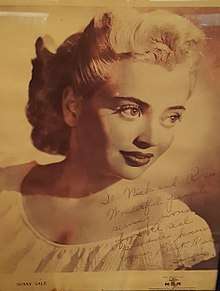Sunny Gale
Sunny Gale (born Selma Sega, February 20, 1927) is a retired American pop singer who was popular in the 1950s. Gale reached the Billboard Hot 100 several times throughout the earlier half of the decade, scoring her biggest R& B hit with "Wheel of Fortune" with the Ed Wilcox Orchestra in 1952, prompting Capitol to cover the recording (in almost exactly the same arrangement) by Kay Starr for a #1 pop hit the same year.
Sunny Gale | |
|---|---|
 c. 1950 | |
| Background information | |
| Birth name | Selma Sega |
| Born | February 20, 1927 Clayton, New Jersey, United States |
| Genres | Pop music |
| Occupation(s) | Singer |
| Years active | c.1943–late 1950s |
| Labels | Derby, RCA Victor |
Biography
She was born as Selma Sega in Clayton, New Jersey, where she competed in singing contests at an early age, sometimes against future musicians Eddie Fisher and Al Martino. After participating in the Miss Philadelphia beauty contest at 16 years-old, and reaching the finals with her vocal prowess, Sega began receiving contracts to establish herself on the city's nightclub circuit. Sega performed in Philadelphia for five years, and employed the stage name Sunny Gale as early as August 1948, which is evident by her early photoshoots. In 1949, Gale joined bandleader Hal McIntyre's orchestra on a series of successful concerts across the United States and Canada.[1]
Gale's manager Gary Romero secured a recording contract with Derby Records in 1951. In accordance with Romero's suggestion, Gale recorded "Wheel of Fortune", a song written by Bennie Benjamin and George David Weiss. However, as soon as other rival record companies saw the potential of a hit, several artists recorded the composition in rapid succession, including Sammy Kaye, the Bell Sisters, and the Cardinals. Gale's rendition, nonetheless, managed to chart at number 13 on the Billboard Hot 100, but was soon overtaken by Kay Starr's novelty take on "Wheel of Fortune", which became a number one hit.[1][2]
The publicity from Gale's chart battle with Starr resulted in bookings across the East coast, most notably a stint at the Paramount Theater in New York City. Gale recorded two additional singles for Derby, "A Lasting Thing" and "My Last Affair", but the small label could not effectively promote the releases as well as "Wheel of Fortune". Despite the commercial successes of Gale and label-mates Trudy Richards and Bette McLaurin, Derby filed for bankruptcy in October 1954, although by then Gale had already signed with RCA Records two years prior.[1] With RCA's backing, Gale recorded a string of national charting hits between 1952 and 1956, including "I Laughed at Love", "Teardrops on My Pillow", "Love Me Again", "Goodnight, Sweetheart, Goodnight".[3][4] During this time of positive commercial fortunes, Gale appeared in clubs operated by business owner Frank Palumbo, particularly his entertainment complex Palumbo's, and at the Brooklyn Academy of Music in an all-star benefit show which also featured the Ink Spots, Red Buttons, Lena Horne, and several others.[1]
By mid-1956, Gale had signed with Decca Records, debuting with a rendition of Otis Williams and the Charms' "Two Hearts". But for Gale, subsequent releases on Decca, Warwick Records, and Blaine Records could not propel her back into the national charts. Her post-music life is relatively unknown; however, as of 2015 Gale was reportedly residing in a retirement home in Florida. Despite being a major presence in 1950s pop music, it was not until the late 1990s that compilation albums, such as The Story of Sunny Gale and Sunny Gale Sings, began to document Gale's recording career.[5]
Charting singles
- Feb. 1952: "Wheel of Fortune" (with Eddie Wilcox Orchestra) - Derby 787 - Billboard #13
- Sept. 1952: "I Laughed at Love" (with Ralph Burns Orchestra) - RCA Victor 4789 - #14
- Jan. 1953: "Teardrops on My Pillow" / "A Stolen Waltz" (with Ralph Burns Orchestra) - RCA Victor 5103 - #12 / #15
- Sept. 1953: "Love Me Again" / "Before It's Too Late" (with Hugo Winterhalter Orchestra) - RCA Victor 5424 - #22 / #27
- July 1954: "Goodnight, Sweetheart, Goodnight" (with Joe Reisman Orchestra) - RCA Victor 5746 - #27
- Sept. 1954: "Smile (Theme from Modern Times)" (with Hugo Winterhalter Orchestra) - RCA Victor 5836 - #19[3]
- Jan. 1955: "Let Me Go, Lover!" / "Unsuspecting Heart" (with Hugo Winterhalter Orchestra) - RCA Victor 5952 - #17 / #14
- Nov. 1955: "C'est La Vie" (with Joe Reisman Orchestra) - RCA Victor 6286 - #85
- Apr. 1956: "Rock and Roll Wedding" (with Joe Reisman Orchestra) - RCA Victor 6479 - #66[4]
References
- Vanshees, Benoit. "Sunny Gale". retroscoop.com. Retrieved October 17, 2016.
- Marion, J.C. "Remembering Sunny Gale". home.earthlink.net. Retrieved October 18, 2016.
- Joel Whitburn (1986). Pop Memories 1890-1954. Record Research Inc. p. 167. ISBN 0-89820-083-0.
- Joel Whitburn (2003). Top Pop Singles 1955-2002. Record Research Inc. p. 270. ISBN 0-89820-155-1.
- "Sunny Gale - The Forgotten Legend". mentalitch.com. Retrieved October 18, 2016.